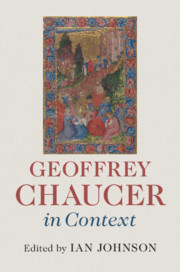Book contents
- Geoffrey Chaucer in Context
- Geoffrey Chaucer in Context
- Copyright page
- Contents
- Illustrations
- Contributors
- Abbreviations
- Introduction
- Part I Chaucer as Context
- Part II Books, Discourse and Traditions
- Part III Humans, the World and Beyond
- Chapter 19 Chaucer’s God
- Chapter 20 Holiness
- Chapter 21 Secularity
- Chapter 22 The Self
- Chapter 23 Women
- Chapter 24 Sex and Lust
- Chapter 25 Animals in Chaucer
- Part IV Culture, Learning and Disciplines
- Part V Political and Social Contexts
- Part VI Chaucer Traditions
- Further Reading
- Index
Chapter 23 - Women
from Part III - Humans, the World and Beyond
Published online by Cambridge University Press: 24 June 2019
- Geoffrey Chaucer in Context
- Geoffrey Chaucer in Context
- Copyright page
- Contents
- Illustrations
- Contributors
- Abbreviations
- Introduction
- Part I Chaucer as Context
- Part II Books, Discourse and Traditions
- Part III Humans, the World and Beyond
- Chapter 19 Chaucer’s God
- Chapter 20 Holiness
- Chapter 21 Secularity
- Chapter 22 The Self
- Chapter 23 Women
- Chapter 24 Sex and Lust
- Chapter 25 Animals in Chaucer
- Part IV Culture, Learning and Disciplines
- Part V Political and Social Contexts
- Part VI Chaucer Traditions
- Further Reading
- Index
Summary
Geoffrey Chaucer had a mother. He also had a wife, a daughter, a sister-in-law. He was a page in the household of a noblewoman. He may well have had a lover. He encountered women of all kinds, all shapes and sizes, ranks and degrees, ages and stages of life, and many versions of these women found their way into his works. In the later Middle Ages, society was divided into three estates: those who pray -- the clergy; those who fight -- the aristocracy and landed gentry; and those who work -- commoners, encompassing peasants, artisans, merchants and burgesses, among others. Women, tellingly, were usually categorised by virtue of the estate of their father or husband. This chapter sets out to convey, briefly, a sense of the wide range of women’s lives in Chaucer’s England. It offers glimpses into the lives of young women, widows, nuns, women of the court, urban women, country women and women of the streets, bolstered by vignettes of historical figures from the period.
- Type
- Chapter
- Information
- Geoffrey Chaucer in Context , pp. 194 - 200Publisher: Cambridge University PressPrint publication year: 2019



